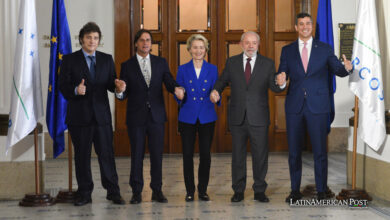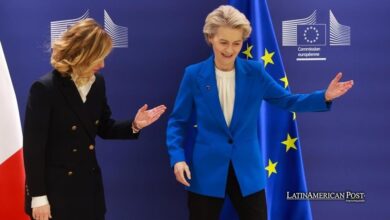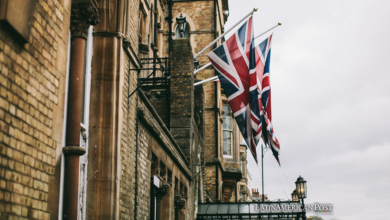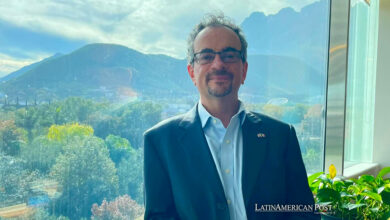Brexit time has come
January 31 was officially the last day of the United Kingdom as part of the European Union, from now on they will enter a process of transition to finalize the departure .

Flags of the United Kingdom and the European Union. / Photo: Pixabay – Reference Image
LatinAmerican Post | Juliana Suárez
Listen to this article
Leer en español: Llegó la hora del Brexit
After a referendum in 2016 and multiple stumbling blocks and attempts to knock down the process, the departure from the United Kingdom is a reality and the farewell came with feelings divided between happiness and sadness. On Friday, January 31 at 11 p.m. (Brussels time), the United Kingdom ceased to be part of the European Union after almost 50 years of being part of the conglomerate of European countries.
The day of celebration for the Brexit Party and for the Prime Minister, Boris Johnson, finally arrived. Therefore, the pro-Brexit advisers and the cabinet of ministers met at a party organized by Johnson himself on Friday night in Downing Street.
The exit of the EU came after the Prime Minister, who replaced Theresa May after his resignation, lashed out at Parliament, which since the referendum had made it very difficult for those who were in favor of Brexit. During the May period, he could not reach any parliamentary agreement, so the exit was still postponed. After the arrival of Johnson, new parliamentary elections were called and the change of the deputies gave him an advantage that ended up favoring an agreement for the exit.
Such as the Prime Minister and his cabinet, thousands of citizens gathered in the main cities of the United Kingdom to wait for the time when their Nation would say goodbye to the European Union. With messages from important figures, shouts and a live show, citizens celebrated the moment as if it were the independence of their country.
On the facade of the Prime Minister's house, No. 10 Downing Street, where the celebration party was planned, a previous count with the United Kingdom flag was reflected in the background. When the counter marked zero, the chimes of the famous London clock, Big Ben, marked the sound of the celebration for those who were gathered. Important figures of Brexit, such as the leader of the Brexit Party, Nigel Farage, gave a few words celebrating the beginning of a new era.
Moments before the final hour, Boris Johnson sent a message to all citizens, with the intention of uniting the entire nation, even those who are against the decision, as it was a "democratic request."
Tonight we are leaving the European Union. pic.twitter.com/zZBsrf4BLe
— Boris Johnson (@BorisJohnson) January 31, 2020
Farewell in the European Parliament
As the last protocol act of the island as a member of the European Union, parliamentarians met in an assembly in Brussels, the 'capital' city of the EU. In it, the British deputies, the majority, who are against the withdrawal, cried, sang and wore a scarf with the words Always United. “We will always love you and we will never be far. Long live Europe”, were some of the words of the president of the European Commission, Ursula von der Leyen.
To our British friends pic.twitter.com/FAtDRazU36
— Ursula von der Leyen (@vonderleyen) January 29, 2020
The deputies, both from the United Kingdom and the other member countries, regretted that the day had come because they considered that the country should continue to be part of the EU. Europe has gone through great wars in its history, so its countries found a way to resist joining, with the motto United in diversity. For this reason, MEPs expect the country to rejoin at some point.
The moment also came with the opportunity for reflection for those who continue to be members of the EU. MEP Philippe Lamberts took the opportunity to say that they must learn from the lessons left by this historic decision. The European Union has to “recover the hearts and minds of European citizens”, for which it must focus on the benefits of all citizens of the different member countries.
Read also The challenges of the new British parliament
Not everything was sadness at the last assembly. Of the 73 deputies that the United Kingdom had, some were 'Eurosceptics' and members of the Brexit Party. Therefore, in his speech he spoke against the block and the need to turn towards the needs of each country, thus reinforcing the nationalist discourse with which he won the referendum in 2016. He spoke of the benefits that the United Kingdom had with the exit, also affirming that 'there will be no more bullying'.
"That is, what we should not like (to leave the EU)?" Asked Nigel Farage, leader of the Brexit Party rhetorically. His speech was full of tension; while his followers applauded him, the other deputies booed him. "I know you're gonna miss us", he said, to which a deputy replied: "We're not gonna miss you". His speech ended up saying goodbye with flags in the hands of the deputies of the party, with the message that one day he hoped to work with them but as a sovereign country while listening to the boo of the other deputies.
.@Nigel_Farage: "No more financial contributions, no more European Court of Justice, no more common fisheries policy, no more being talked down to, no more being bullied." pic.twitter.com/ZQ8aQ4qVmM
— BrexitCentral (@BrexitCentral) January 29, 2020
What is coming …
The withdrawal process from the European Union will not happen overnight. While January 31 was a significant and especially symbolic day, moving from having an internal political, economic and multinational system to creating one's own foreign relations takes a while.
This process was the main reason why Brexit took more than 1300 days to complete, as a sector of Parliament refused to leave the European Union without reaching an agreement that would benefit them and not leave them adrift once the exit.
Therefore, when the day comes, it does not mean that from the first of February they will already be independent of the block. The transition process will take about a year in which they will continue to comply with EU rules and make their corresponding payments. The final exit of the block will arrive on December 31, 2020.
Meanwhile, the United Kingdom will have to find new business allies and foster its external relations with the different regions of the world. In this year, you can start enlisting treaties and trade rules. However, they are not yet allowed to begin their negotiations with Australia or the United States, and much remains to be agreed on the relationship they will continue to maintain with the European Union.
Read also Russia: is Putin's government in crisis?
Other things that will change in this transitory process will be the currency, which RU has been preparing for months, passports and the exit of the organizations of the block, as well as the commission that was created for Brexit.
Also, the relationship with the block will change from the beginning. The 73 MEPs lose their seats immediately in the European Parliament, as they no longer have any power or political influence in the EU. For this reason, they will not implicitly be part of the events or conferences that exist on European issues. To do so, they will have to have an invitation from the block that will only be given to Boris Johnson.
However, the intention is to make this process no less drastic for citizens, so most aspects of their daily lives will not change yet. They can travel anywhere within the EU, allowing the British to have the same benefits as when they were part of the block. Driving licenses, medical insurance and pensions will remain the same, just as those who are from the United Kingdom and live or work in other countries can continue with their status as European 'citizens'.




